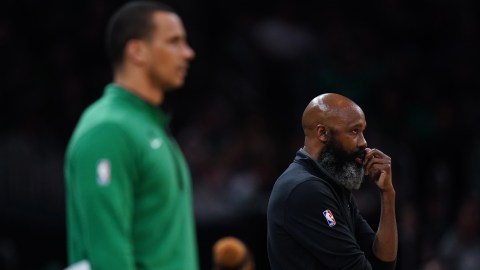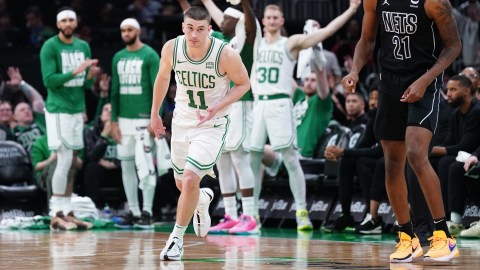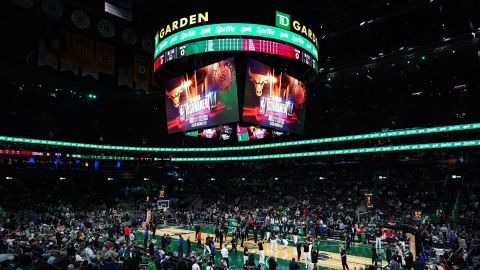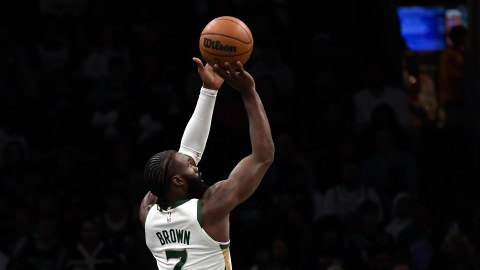 BOSTON — Meet Reggie Evans, the Apple device of basketball players.
BOSTON — Meet Reggie Evans, the Apple device of basketball players.
Evans has attracted some deserved attention lately for his role in helping the Nets cement their place in the top of the Eastern Conference playoff standings. Since he moved into the starting lineup for good on Dec. 31, the Nets are 30-18, and his three 20-rebound games in the past two weeks have opened the eyes of some who previously thought the 11th-year pro out of Iowa was a limited, yet valuable, garbage man.
Much like the latest iPod, though, Evans is not nearly as new and improved as you might like to think. He is just as effective as ever, with just a few adjustments and extenuating factors that have helped him be more efficient — and seem a little bit cooler in the process.
“It’s more just good decisions,” said P.J. Carlesimo, who made Evans a starter four days after becoming the Nets’ head coach. “We’ve basically told him all year that if he gets a rebound and he has an opportunity for a stick-back, to go up. If not, try to find a 3-point shooter on the perimeter. That’s pretty much what he’s done, but right now he’s just creating more shots for himself. It’s not just the stick-backs, it’s also the baby left-handed hooks and things like that.
“The thing people forget, he’s not very tall [at 6-foot-8], so it’s not always easy for him to finish inside. It’s not just a question of, he gets a rebound and has to go right back up. He’s got to work a little bit more if there’s not space available to him, and he’s doing that very well.”
Yes, Evans’ decision-making has improved, and his production has steadily increased each month from 7.8 points and 3.1 rebounds per game in December to 17.8 points and 8.0 rebounds per game in April. But the most important factor in his higher averages might not be anything he is doing at all.
Evans’ “improved” play has conveniently coincided with increased playing time. He received less than 20 minutes per game with zero starts in November and is now a mainstay of the starting lineup who plays more than 30 minutes a night. His per-minute production is better, but not otherworldly, compared to his career norms. He is grabbing 25.8 percent of all available rebounds while he is on the court, the best rebounding rate in the league, but he has had seasons like that before. His rebound rate was 25.7 two seasons ago in Toronto, and as far back as 2007 he posted a rebound rate of 22.9 as a reserve in Denver.
The main differences are that Evans is playing more — 24.5 minutes per game, the second-highest average of his career — and that he is doing it in the media capital of the world. He no longer does the dirty work in the anonymity or Seattle or Toronto. He does it for a New York-based team, and a playoff-bound New York team at that. It is no coincidence that his teammate, Deron Williams, saw his jersey become the sixth-most popular seller in the NBA in his first season as a member of the Brooklyn (not New Jersey) Nets.
Evans is still far from a double-double machine. His 14-point, 20-rebound game against the Bobcats last weekend and his 17-point, 24-rebound performance against the Sixers three days later created some irrational exuberance around the career 4.1 points-per-game scorer. Against the Celtics on Wednesday he was back to posting a much more Evans-like stat line of 17 rebounds with just a single point.
If the Nets make a run in the East and do something really shocking, like give the Heat a scare in the second round, they can point to four main factors.
The first is Wiliams’ midseason turnaround, as the all-world point guard looks to be finally healthy and dominant again. The second is the December coaching change from Avery Johnson to Carlesimo, who has helped the Nets regain their edge. The third is the emergence of Brook Lopez, always an effective go-to offensive threat in the post, as something other than a total liability on defense.
Fourth and finally, the Nets can thank Evans, the garbage man, for turning trash into treasure. Unlike those other three reasons for Brooklyn’s improvement, however, Evans’ impact required no change in health, coaching style or defensive focus. He simply needed to get more chances to do what he has always done, and done well.
Have a question for Ben Watanabe? Send it to him via Twitter at @BenjeeBallgame or send it here.



